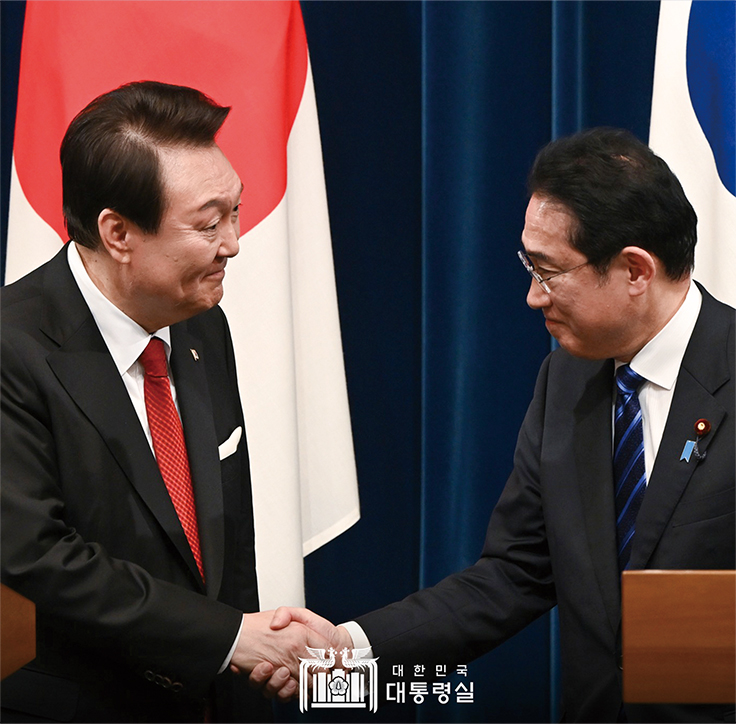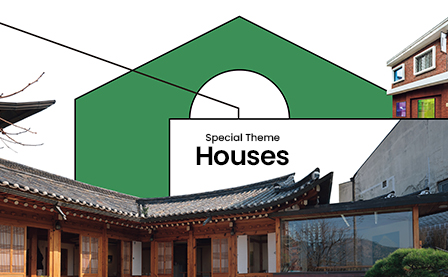April 2023

 The leaders of Korea and Japan on Mar. 16 shake their hands. © Office of the President
The leaders of Korea and Japan on Mar. 16 shake their hands. © Office of the PresidentA New Start in Korea-Japan Ties
A big step was taken in the strained Korea-Japan ties when South Korean President Yoon Suk Yeol on Mar. 16 held summit talks with his Japanese counterpart.
contributing writer
Milestone in Strained Ties
Korea and Japan have a long history of acrimony, dating back to the latter’s colonial occupation of the Korean Peninsula about a century ago. The two neighbors normalized relations in 1965 which, however, soured as their unresolved historical disputes continued to fester, in particular over Japan’s use of forced labor and so-called “comfort women” sex slaves during its colonization.
Now, the two countries appear ready to put their relations back on track after years of animosity over historical disputes.
President Yoon met with Japanese Prime Minister Fumio Kishida in Tokyo for summit talks, the first such visit in 12 years. Yoon’s visit was hailed as an important milestone in improving Korea-Japan ties which opens a new era of full-fledged bilateral exchanges.
As both countries share security challenges from North Korea to rising concerns about China, Yoon views A Japan as an ally of strategic importance to jointly confront those growing threats. “There is an increasing need for Korea and Japan to cooperate in this time of a polycrisis. We cannot afford to waste time while leaving strained Korea-Japan relations unattended,” Yoon said.
Fence-mending Summit
In the long-awaited summit, both leaders agreed to resume regular visits that have been on hold for more than a decade. The leaders vowed to resume defense dialogue and vice-ministerial strategic talks, while also restarting a process of trilateral communication among Korea, Japan and China.
Korea also agreed to completely restore its military intelligence-sharing agreement with Japan, which was scrapped in 2019 amid a long-running dispute over forced labor, to better respond to North Korea’s nuclear and missile threats.
Amid the ever-escalating threat of North Korea’s nuclear missile program, both viewed reinforcement of Korea-Japan relations as an “urgent task” to wisely counter the threat. Better bilateral relations would greatly help both countries deal with their security crises, Yoon said.
Hours before the summit, the thaw in the frozen Korea-Japan ties already unfolded when Japan agreed to lift export restrictions on Korea, while Seoul decided to withdraw its complaint over the matter to the World Trade Organization. Japan had put in place its export controls against Seoul shortly after the Korean Supreme Court in 2018 orreladered Japanese companies to pay compensation to Korean victims and bereaved relatives.
After the summit, Yoon said the bilateral meeting “has special significance as it shows the people of both countries that the bilateral relations are off to a new beginning after being plagued by various issues.” “The two countries that share the same democratic values are partners that must cooperate on security, economic issues and global agendas.”
Japan’s prime minister called their meeting a “big step” to rebuilding the two nation’s security and economic ties as they try to overcome a century of difficult history. “From now on, I would like to open a new chapter in Korea-Japan relations through frequent visits by both sides that are not tied down by formality,” the prime minister said.
The Korea-Japan summit was welcoming news to the international community, especially to the U.S. which had worked intensively to bring about the talks. The White House said, “President Yoon and Prime Minister Kishida are taking a critical step to forge a future for the Korean and Japanese people that is safer, more secure and more prosperous. The United States will continue to support the leaders of Japan and Korea as they take steps to translate this new understanding into enduring progress.”
 News Ticker
News Ticker View of all
View of all





